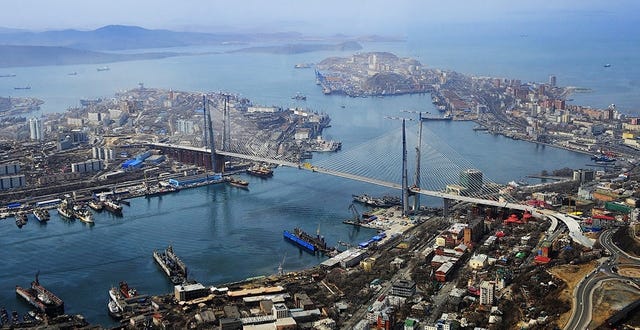Dear all
It’s just a quick post today because I want to introduce something that has far more scope to it than a single newsletter: the relationship between China and Russia.
Hardly a week goes by without another story in the press about how these two countries are building an anti-Western alliance. That may be the case for now, but what’s important to realise is that it’s not a permanent alliance, and certainly not a meeting of equals.
A news report this week from the world of reality TV provides a handy comparison for revealing how Russia and China really sit together.
As always, please do comment if you disagree (or agree) with me. And feel free to share and subscribe.
On a final note, I’m having a few days off this weekend and so I’m going to have to postpone my new History of China post – about the fall of the Han Dynasty, including reference to one of my favourite John Woo films – until the weekend after.
I’ll be back next Tuesday with some more thoughts on What China Wants.
Many thanks for reading.
***
The news of a Russian man trapped in a Chinese reality TV show might not, at first glance, have much to do with geopolitics, but in reality it’s a solid analogy for one of the more interesting – and potentially worrying – bilateral tie-ups seen in recent years.
When Vladislav Ivanov, a good looking 27-year-old from Vladivostok, agreed to appear on a Chinese reality TV show he found himself trapped. Unable to leave without paying a huge fine, he appeared and reappeared week after week as the Chinese public refused to vote him off. Not even his lack of enthusiasm – singing half-heartedly, telling the audience he didn’t want to be there – was enough to get him released from his obligations. Finally, eleven weeks in, he managed to find enough votes for him to leave.
Ivanov’s fate comes at a time when his motherland is finding itself increasingly drawn into a relationship with China that it is likely to ultimately regret.

Ever since Russia’s invasion of Ukraine and the enmity this caused in Europe and America, Moscow and Beijing have been coming closer together. Beijing for example now provides financing and high-tech components that Moscow can no longer access in the West. In return, 80% of China’s military imports come from Russia, including the Sukhoi Su-35 fighter plane.
Other military ties are also increasing. The People’s Liberation Army joined Russia’s 2018 “Vostok” exercise in 2018, the first time forces from outside the former Soviet Union had taken part. More recently Russian and Chinese naval forces have performed joint patrols, including trilateral exercises with Iran in the Gulf of Oman.
The ever-closer relationship reaches right to the top. In 2018 President Xi gave President Putin China’s first friendship medal, and announced to the world that Vladimir was now his best friend.
The reason behind this is clear: a mutual mistrust, and even loathing of the West. This is particularly the case in Russia, where Putin’s Set have recently launched a programme of anti-Western propaganda, possibly as a way of diverting attention from the country’s increasing woes.
Yet Moscow would be very much mistaken if it felt that Beijing viewed this warming of relations as anything other than a tactical alliance. For a start, it is not a meeting of equals: Russia has 10% the population of its south-easterly neighbour, and an economy just 13% the size.
China also has long-standing grievances against Russia that are unlikely to remain in check once Moscow’s use to Beijing is over. Whilst it is the British-led Opium Wars of the mid 1800s that have become the focus of the Communist Party’s diatribes over the “century of humiliation” that China endured, it is Russia that has had a far longer negative history with China, dating back to 1689 when they signed their first treaty together.

The British may have taken Hong Kong (area: 1,106 km2), but the amount of territory that Russia removed from China in just one event, the 1858 Treaty of Aigun, amounted to 600,000 km2 – about the size of Ukraine. Despite the 2001 Sino-Russian Treaty of Friendship, which theoretically called an end to territorial disputes between the two, China has a claim to these lands as much as Russia had a claim to the Crimea.
The real relationship between the two countries can be summed up by the $400 billion “Power of Siberia” pipeline that is being built to connect Russian gas and Chinese energy demand. Signed in the wake of the fallout from Crimea, Moscow was forced to accept a 30 year contract that is likely to be mildly profitable at best.
For now, as the anti-Western programme runs its course, both sides are happy to keep the gas flowing. But as and when Moscow and Beijing eventually fallout – as they did in 1960 when Chairman Mao took against Nikita Khrushchev – Russia will find that it has as much chance of getting out of its Chinese obligations as its hapless reality TV star did.
As and when this new Sino-Soviet split might happen, we will discuss in the posts to come.




Very interesting Sam - I don't disagree with your overall conclusion regarding current relations (the Russians really are deeply worried about Chinese influence in their sparsely-populated Far Eastern territories). On the historical front though I'd make a slight correction - from the 17th to the mid-19th centuries Russian relations with the Qing empire were actually remarkably good. The Treaty of Nerchinsk in 1689 was not an 'unequal' treaty in the 19th-century mould, not least because the Qing were far more powerful than Muscovy in East Asia at that date. The Russians had to give up their claims to the Amur valley after the Qing took their fortress of Albazin, but the Qing were willing to concede their control of territory in Eastern Siberia because at that date they were much more worried about the threat from the Junghar confederacy, and wanted to settle things quickly with Muscovy. Brokered by Jesuit priests, Nerchinsk ushered in almost 200 years of reasonably amicable relations, consolidated by the treaty of Kiakhta in 1722 which allowed Russia, uniquely among the European powers, to maintain regular trade relations with China and establish an Orthodox Christian mission in Peking. It was precisely because of this earlier history of good relations that Nikolai Murav'ev's seizing of territory along the Amur and the subsequent treaty of Aigun were seen as such a betrayal.